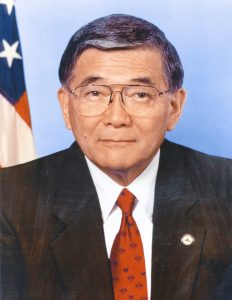A new curriculum with lesson plans from the Mineta Legacy Project and SPICE features powerful imagery, engaging videos and diverse voices.
LOS ANGELES — It is a question for our time: What Does It Mean to Be an American?
That is the name of a new interactive and free curriculum for high school and college students, designed to engage future leaders by sparking conversations about American identity and history.
Launched in September, the curriculum was developed by the Mineta Legacy Project and the Stanford Program on International and Cross-Cultural Education.
Packed with strong imagery and thought-provoking videos, including interviews with former U.S. Presidents George W. Bush and Bill Clinton, “What Does It Mean to Be an American?” presents engaging lessons on six key issues: immigration, civil liberties and equity, civic engagement, justice and reconciliation, leadership and U.S.-Japan relations, according to Rylan Sekiguchi, curriculum designer for SPICE at Stanford University.
“Our six, standards-aligned lessons provide for powerful 21st-century learning that connects to students’ lives and showcases a diverse range of American voices — from young adults to our former presidents,” Sekiguchi said.
“The powerful learning tool we provide will help students and teachers tackle challenging questions and thoughtfully examine the American experience through historical and modern-day lenses,” said Dianne Fukami of the Mineta Legacy Project.

The newly released curriculum examines the life of Sec. Norman Y. Mineta and delves into important topics that deal with the American experience.
The curriculum features compelling video dialogues from young Americans discussing their experiences growing up in America, including African American men discussing what it means to be a young black male in America and young Muslim Americans sharing what they want people to know about their community.
“These lessons reflect America’s diversity and challenge students and teachers to start a dialogue around identity and history,” Sekiguchi said. “We go beyond the four walls of the classroom to teach meaningful ideas that are relevant to our lives today.”
Inspired by the life and career of Sec. Norman Y. Mineta, the curriculum examines key themes including his imprisonment during World War II with other Japanese Americans at Heart Mountain Relocation Center in Wyoming, Fukami said. Following his incarceration, Mineta would become the first Asian American mayor of a major city (San Jose, Calif.). the first Japanese American from the mainland to be elected to Congress and the first Asian American to serve in a presidential cabinet. A bipartisan visionary who championed political civility, Mineta served in the Clinton and Bush cabinets.

Norman Mineta
“In many ways, Sec. Mineta’s life is a living lesson in American history and American identity,” Fukami said. “Even as we look at the issues facing our nation today, especially around issues of race, equity and civil liberties, we can look at the experience of Sec. Mineta both as a former incarceree and as a leader who broke barriers to rise to power.”
With separate modules for students and teachers, “What Does It Mean to Be an American?” is broken out into six lessons to encourage class discussion and critical thought. Lesson plans emphasize deeper thinking with interactive activities that reinforce learning. Areas for study and discussion include:
- Immigration — Explore the history of immigration to the U.S., challenges and opportunities immigrants encounter and how immigration has contributed to the evolution of our nation.
- Civil Liberties and Equity — What is the meaning and value of civil liberties? What is the meaning of civil rights? Examine the incarceration of Japanese Americans during WWII and parallels to contemporary issues.
- Civic Engagement — Examine the rights and responsibilities of citizens in a democracy and why community empowerment and civic engagement are important.
- Justice and Reconciliation — Examine the meaning of justice, the roles that justice and reconciliation play in society and the various historical and current-day movements for social justice.
- Leadership — Through self-reflection and discussion, explore and refine ideas about effective leadership and how to foster these qualities.
- S.-Japan Relations — Investigate the history between the U.S. and Japan and probe key issues in contemporary U.S.-Japan relations.
“This curriculum launches at a critical moment as young people are reflecting on the power structure in our country, as well as on our nation’s diversity and future,” said Mineta.
The curriculum is available online at www.whatdoesitmeantobeanamerican.com. It is designed for mobile, tablet and desktop applications and can be easily shared and downloaded.



